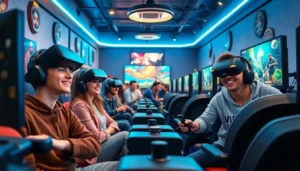In the ever-changing landscape of video gaming, few brands have left as significant an imprint as PlayStation. From its inception in the 1990s to its current dominance in the gaming world, the evolution of PlayStation consoles mirrors not just advancements in technology but also shifts in gaming culture itself. This exploration delves into the rich history of PlayStation, its impact on gaming culture, what the future holds, and how online engagement is reshaping the gaming community.
Table of Contents
ToggleThe Evolution Of PlayStation Consoles

The journey of PlayStation began in December 1994, marking its entry into the gaming market with the original PlayStation. This console revolutionized the gaming world, introducing 3D graphics and a CD-based format that offered greater storage than the cartridges of its predecessors. Fast forward to today, and the PlayStation line has grown to encompass multiple generations, each boasting significant technological advancements.
- PlayStation 2 (2000): This console not only took gaming to new heights with improved graphics and the introduction of DVD playback but also became the best-selling console of all time. Its vast library of games solidified PlayStation’s dominance.
- PlayStation 3 (2006): Marking a shift toward online gaming, the PS3 introduced features such as Blu-ray support and PlayStation Network capabilities, which allowed players to engage with each other online.
- PlayStation 4 (2013): With a powerful GPU and an emphasis on social gaming features, the PS4 won over gamers worldwide, leading to millions of sold units. Titles like “The Last of Us” and “God of War” showcased the console’s impressive capability.
- PlayStation 5 (2020): The latest iteration combines cutting-edge hardware with innovative features, including haptic feedback and a fast SSD that significantly reduces load times, dramatically enhancing the gaming experience. Its growing library continues to cater to both hardcore and casual gamers alike.
The evolution of PlayStation consoles tells a story of innovation and adaptation, positioning the brand as a leader in the gaming industry.
PlayStation’s Impact On Gaming Culture
PlayStation has not just been a series of consoles: it has shaped gaming culture in profound ways. The brand has introduced game narratives that resonate deeply with players, elevating video games from mere entertainment to a form of artistic expression.
Must-Play PlayStation Exclusives
Several titles stand as cornerstones within the PlayStation ecosystem, defining moments in gaming history:
- Final Fantasy VII: This 1997 classic introduced players to a rich narrative combined with stunning visuals for its time, forever changing the RPG genre.
- Gran Turismo: It set a benchmark for racing games with its realistic driving mechanics and extensive vehicle selection.
- Uncharted Series: Combining cinematic storytelling with thrilling gameplay, this series has captivated millions, showcasing the capabilities of PlayStation consoles.
- Spider-Man (2018): This title garnered critical acclaim for its engaging story, character development, and stunning open-world design, proving that superhero games can offer deep narratives.
With each console, PlayStation has consistently crafted experiences that embody the essence of modern gaming, showcasing narratives that reflect real-world issues, diverse characters, and complex emotions.
The Future Of PlayStation Gaming
As the gaming landscape continues to evolve, so does the vision for the future of PlayStation. Sony has committed to staying ahead of trends and shaping the next generation of gaming with innovative technologies.
Emerging Technologies In Gaming
Emerging technologies like virtual reality (VR) and cloud gaming are set to redefine how gamers engage with content. With the release of PlayStation VR, players have gained immersive experiences that were once the stuff of science fiction. This technology opens doors to new gameplay mechanics, allowing players to step into their favorite games in an unprecedented way.
Cloud gaming platforms, such as PlayStation Now, demonstrate the shift toward accessibility. Players can stream games without requiring advanced hardware, effectively democratizing gaming by allowing more individuals to participate regardless of their financial investment in gaming rigs. Besides, along with upcoming hardware releases, Sony is focusing not only on high-resolution gaming and mechanics but also on creating interconnected gaming environments, reflecting the growing community aspect of gaming.
Online Gaming And Community Engagement
Online gaming has exploded in popularity, primarily due to the social connectivity it offers. PlayStation platforms help this sense of community, allowing gamers to connect, cooperate, or compete against each other across the globe.
Personal Experiences As A Gamer
Many individuals share stories of how online multiplayer games foster relationships and a sense of belonging. Whether it’s through intense battles in “Fortnite” or cooperative missions in “Destiny 2,” players form bonds that extend beyond the screen. The rise of eSports has further fueled this engagement, turning competitive gaming into a spectator sport watched by millions. Events like the Overwatch League exemplify the cultural shift, demonstrating how gaming is no longer just an individual pastime but a communal experience.
Social media also plays a crucial role, with platforms like Twitter and Twitch allowing gamers to showcase their skills, share experiences, and build connections. PlayStation has adapted to this trend, integrating social features directly into its consoles, further enhancing community interaction and engagement.
Conclusion
The PlayStation brand has transcended its role as a gaming console: it has become an integral part of modern culture and social interaction. As technology continues to evolve, so too will PlayStation, pushing the boundaries of what is possible in gaming.
From its beginnings in 1994 to today’s groundbreaking experiences, PlayStation’s impact is undeniable. It has shaped gaming narratives, fostered communities, and set the stage for the future of entertainment as a whole. As gamers look forward to emerging technologies and the next generation of consoles, one thing remains certain: PlayStation will continue to be a major player in the gaming world.





